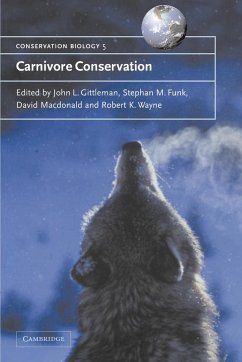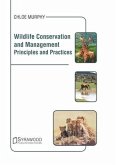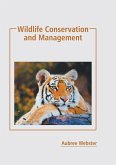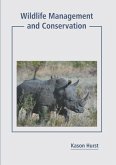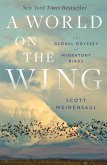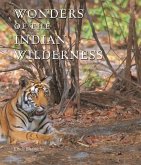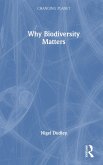L. Gittleman / M. Funk / W. MacDonald / K. Wayne (eds.)
Carnivore Conservation
Herausgeber: Gittleman, John L.; Macdonald, David; Funk, Stephan M.
L. Gittleman / M. Funk / W. MacDonald / K. Wayne (eds.)
Carnivore Conservation
Herausgeber: Gittleman, John L.; Macdonald, David; Funk, Stephan M.
- Broschiertes Buch
- Merkliste
- Auf die Merkliste
- Bewerten Bewerten
- Teilen
- Produkt teilen
- Produkterinnerung
- Produkterinnerung
Critical review and summary of the problems, solutions and future directions for carnivore conservation.
Andere Kunden interessierten sich auch für
![Wildlife Conservation and Management: Principles and Practices Wildlife Conservation and Management: Principles and Practices]() Wildlife Conservation and Management: Principles and Practices143,99 €
Wildlife Conservation and Management: Principles and Practices143,99 €![Wildlife Conservation and Management Wildlife Conservation and Management]() Wildlife Conservation and Management142,99 €
Wildlife Conservation and Management142,99 €![Wildlife Management and Conservation Wildlife Management and Conservation]() Wildlife Management and Conservation140,99 €
Wildlife Management and Conservation140,99 €![A World on the Wing: The Global Odyssey of Migratory Birds A World on the Wing: The Global Odyssey of Migratory Birds]() Scott WeidensaulA World on the Wing: The Global Odyssey of Migratory Birds28,99 €
Scott WeidensaulA World on the Wing: The Global Odyssey of Migratory Birds28,99 €![Hunter Green: An Introduction to Hunting for the Eco-Aware Who Think Hunting is Weird But Are Kind of Considering It Hunter Green: An Introduction to Hunting for the Eco-Aware Who Think Hunting is Weird But Are Kind of Considering It]() Thomas HudsonHunter Green: An Introduction to Hunting for the Eco-Aware Who Think Hunting is Weird But Are Kind of Considering It31,99 €
Thomas HudsonHunter Green: An Introduction to Hunting for the Eco-Aware Who Think Hunting is Weird But Are Kind of Considering It31,99 €![Wonders of the Indian Wilderness Wonders of the Indian Wilderness]() Erach BharuchaWonders of the Indian Wilderness137,99 €
Erach BharuchaWonders of the Indian Wilderness137,99 €![Why Biodiversity Matters Why Biodiversity Matters]() Nigel DudleyWhy Biodiversity Matters115,99 €
Nigel DudleyWhy Biodiversity Matters115,99 €-
-
-
Critical review and summary of the problems, solutions and future directions for carnivore conservation.
Hinweis: Dieser Artikel kann nur an eine deutsche Lieferadresse ausgeliefert werden.
Hinweis: Dieser Artikel kann nur an eine deutsche Lieferadresse ausgeliefert werden.
Produktdetails
- Produktdetails
- Verlag: Cambridge University Press
- Seitenzahl: 692
- Erscheinungstermin: 9. August 2003
- Englisch
- Abmessung: 229mm x 152mm x 40mm
- Gewicht: 1106g
- ISBN-13: 9780521665377
- ISBN-10: 052166537X
- Artikelnr.: 22266247
- Herstellerkennzeichnung
- Libri GmbH
- Europaallee 1
- 36244 Bad Hersfeld
- gpsr@libri.de
- Verlag: Cambridge University Press
- Seitenzahl: 692
- Erscheinungstermin: 9. August 2003
- Englisch
- Abmessung: 229mm x 152mm x 40mm
- Gewicht: 1106g
- ISBN-13: 9780521665377
- ISBN-10: 052166537X
- Artikelnr.: 22266247
- Herstellerkennzeichnung
- Libri GmbH
- Europaallee 1
- 36244 Bad Hersfeld
- gpsr@libri.de
1. Why 'carnivore conservation'? John L. Gittleman, Stephan M. Funk, David
W. MacDonald and Robert K. Wayne; Part I. Problems: 2. Past and future
carnivore extinctions: a phylogenetic principle Andy Purvis, Georgina M.
Mace and John L. Gittleman; 3. Interspecific competition and the population
biology of extinction-prone carnivores Scott Creel, Göran Spong and Nancy
Creel; 4. Strategies for carnivore conservation: lessons from contemporary
extinctions Rosie Woodroffe; 5. Alien carnivores: unwelcome experiments in
ecological theory David W. Macdonald and Michael D. Thom; 6. Carnivore
introductions and invasions: their success and management options Luigi
Boitani; 7. Hybridization and conservation of carnivores Robert K. Wayne
and David M. Brown; 8. Carnivore demography and the consequences of changes
in prey availability Todd K. Fuller and Paul R. Sievert; 9. Human-carnivore
interactions: adopting proactive strategies for complex problems Marc
Bekoff; 10. The control, exploitation and conservation of carnivores Warren
E. Johnson, Eduardo Eizirik and Gina M. Lento; Part II. Some Approaches and
Solutions: 11. Interdisciplinary problem solving in carnivore conservation:
an introduction Tim W. Clark, David Mattson, Richard P. Reading and Brian
J. Miller; 12. Assessment of carnivore reintroductions Urs Breitenmoser,
Christine Breitenmoser-Würsten, Ludwig N. Carbyn and Stephan M. Funk; 13.
Interactions between carnivores and local communities: conflict or
co-existence? Claudio Sillero-Zubiri and Karen Laurenson; 14. New methods
for obtaining and analyzing genetic data from free-ranging carnivores
Pierre Taberlet, Gordon Luikart and Eli Geffen; 15. Applications of genetic
concepts and molecular methods to carnivore conservation Warren E. Johnson,
Eduardo Eizirik, Melody Roelke-Parker and Stephen J. O'Brien; 16. Role of
reproductive sciences in carnivore conservation David E. Wildt, JoGayle
Howard and Janine Brown; 17. Monitoring of terrestrial carnivore
populations Eric M. Gese; Part III. Prospects for Research and
Conservation: 18. Changing landscapes: consequences for carnivores Melvin
E. Sunquist and Fiona Sunquist; 19. Behavior of carnivores in exploited and
controlled populations Laurence G. Frank and Rosie Woodroffe; 20. The role
of disease in carnivore ecology and conservation Stephan M. Funk, Christine
V. Fiorello, Sarah Cleaveland and Matthew E. Gompper; 21. Geographic
priorities for carnivore conservation in Africa M. G. L. Mills, Stephanie
Freitag and Albert van Jaarsveld; 22. Estimating interpopulation dispersal
rates Peter Waser, Curtis Strobeck and David Paetkau; 23. Setting
priorities for carnivore conservation: what makes carnivores different?
Joshua R. Ginsberg; 24. Conclusions: carnivore conservation: science,
compromise and tough choices David W. Macdonald.
W. MacDonald and Robert K. Wayne; Part I. Problems: 2. Past and future
carnivore extinctions: a phylogenetic principle Andy Purvis, Georgina M.
Mace and John L. Gittleman; 3. Interspecific competition and the population
biology of extinction-prone carnivores Scott Creel, Göran Spong and Nancy
Creel; 4. Strategies for carnivore conservation: lessons from contemporary
extinctions Rosie Woodroffe; 5. Alien carnivores: unwelcome experiments in
ecological theory David W. Macdonald and Michael D. Thom; 6. Carnivore
introductions and invasions: their success and management options Luigi
Boitani; 7. Hybridization and conservation of carnivores Robert K. Wayne
and David M. Brown; 8. Carnivore demography and the consequences of changes
in prey availability Todd K. Fuller and Paul R. Sievert; 9. Human-carnivore
interactions: adopting proactive strategies for complex problems Marc
Bekoff; 10. The control, exploitation and conservation of carnivores Warren
E. Johnson, Eduardo Eizirik and Gina M. Lento; Part II. Some Approaches and
Solutions: 11. Interdisciplinary problem solving in carnivore conservation:
an introduction Tim W. Clark, David Mattson, Richard P. Reading and Brian
J. Miller; 12. Assessment of carnivore reintroductions Urs Breitenmoser,
Christine Breitenmoser-Würsten, Ludwig N. Carbyn and Stephan M. Funk; 13.
Interactions between carnivores and local communities: conflict or
co-existence? Claudio Sillero-Zubiri and Karen Laurenson; 14. New methods
for obtaining and analyzing genetic data from free-ranging carnivores
Pierre Taberlet, Gordon Luikart and Eli Geffen; 15. Applications of genetic
concepts and molecular methods to carnivore conservation Warren E. Johnson,
Eduardo Eizirik, Melody Roelke-Parker and Stephen J. O'Brien; 16. Role of
reproductive sciences in carnivore conservation David E. Wildt, JoGayle
Howard and Janine Brown; 17. Monitoring of terrestrial carnivore
populations Eric M. Gese; Part III. Prospects for Research and
Conservation: 18. Changing landscapes: consequences for carnivores Melvin
E. Sunquist and Fiona Sunquist; 19. Behavior of carnivores in exploited and
controlled populations Laurence G. Frank and Rosie Woodroffe; 20. The role
of disease in carnivore ecology and conservation Stephan M. Funk, Christine
V. Fiorello, Sarah Cleaveland and Matthew E. Gompper; 21. Geographic
priorities for carnivore conservation in Africa M. G. L. Mills, Stephanie
Freitag and Albert van Jaarsveld; 22. Estimating interpopulation dispersal
rates Peter Waser, Curtis Strobeck and David Paetkau; 23. Setting
priorities for carnivore conservation: what makes carnivores different?
Joshua R. Ginsberg; 24. Conclusions: carnivore conservation: science,
compromise and tough choices David W. Macdonald.
1. Why 'carnivore conservation'? John L. Gittleman, Stephan M. Funk, David
W. MacDonald and Robert K. Wayne; Part I. Problems: 2. Past and future
carnivore extinctions: a phylogenetic principle Andy Purvis, Georgina M.
Mace and John L. Gittleman; 3. Interspecific competition and the population
biology of extinction-prone carnivores Scott Creel, Göran Spong and Nancy
Creel; 4. Strategies for carnivore conservation: lessons from contemporary
extinctions Rosie Woodroffe; 5. Alien carnivores: unwelcome experiments in
ecological theory David W. Macdonald and Michael D. Thom; 6. Carnivore
introductions and invasions: their success and management options Luigi
Boitani; 7. Hybridization and conservation of carnivores Robert K. Wayne
and David M. Brown; 8. Carnivore demography and the consequences of changes
in prey availability Todd K. Fuller and Paul R. Sievert; 9. Human-carnivore
interactions: adopting proactive strategies for complex problems Marc
Bekoff; 10. The control, exploitation and conservation of carnivores Warren
E. Johnson, Eduardo Eizirik and Gina M. Lento; Part II. Some Approaches and
Solutions: 11. Interdisciplinary problem solving in carnivore conservation:
an introduction Tim W. Clark, David Mattson, Richard P. Reading and Brian
J. Miller; 12. Assessment of carnivore reintroductions Urs Breitenmoser,
Christine Breitenmoser-Würsten, Ludwig N. Carbyn and Stephan M. Funk; 13.
Interactions between carnivores and local communities: conflict or
co-existence? Claudio Sillero-Zubiri and Karen Laurenson; 14. New methods
for obtaining and analyzing genetic data from free-ranging carnivores
Pierre Taberlet, Gordon Luikart and Eli Geffen; 15. Applications of genetic
concepts and molecular methods to carnivore conservation Warren E. Johnson,
Eduardo Eizirik, Melody Roelke-Parker and Stephen J. O'Brien; 16. Role of
reproductive sciences in carnivore conservation David E. Wildt, JoGayle
Howard and Janine Brown; 17. Monitoring of terrestrial carnivore
populations Eric M. Gese; Part III. Prospects for Research and
Conservation: 18. Changing landscapes: consequences for carnivores Melvin
E. Sunquist and Fiona Sunquist; 19. Behavior of carnivores in exploited and
controlled populations Laurence G. Frank and Rosie Woodroffe; 20. The role
of disease in carnivore ecology and conservation Stephan M. Funk, Christine
V. Fiorello, Sarah Cleaveland and Matthew E. Gompper; 21. Geographic
priorities for carnivore conservation in Africa M. G. L. Mills, Stephanie
Freitag and Albert van Jaarsveld; 22. Estimating interpopulation dispersal
rates Peter Waser, Curtis Strobeck and David Paetkau; 23. Setting
priorities for carnivore conservation: what makes carnivores different?
Joshua R. Ginsberg; 24. Conclusions: carnivore conservation: science,
compromise and tough choices David W. Macdonald.
W. MacDonald and Robert K. Wayne; Part I. Problems: 2. Past and future
carnivore extinctions: a phylogenetic principle Andy Purvis, Georgina M.
Mace and John L. Gittleman; 3. Interspecific competition and the population
biology of extinction-prone carnivores Scott Creel, Göran Spong and Nancy
Creel; 4. Strategies for carnivore conservation: lessons from contemporary
extinctions Rosie Woodroffe; 5. Alien carnivores: unwelcome experiments in
ecological theory David W. Macdonald and Michael D. Thom; 6. Carnivore
introductions and invasions: their success and management options Luigi
Boitani; 7. Hybridization and conservation of carnivores Robert K. Wayne
and David M. Brown; 8. Carnivore demography and the consequences of changes
in prey availability Todd K. Fuller and Paul R. Sievert; 9. Human-carnivore
interactions: adopting proactive strategies for complex problems Marc
Bekoff; 10. The control, exploitation and conservation of carnivores Warren
E. Johnson, Eduardo Eizirik and Gina M. Lento; Part II. Some Approaches and
Solutions: 11. Interdisciplinary problem solving in carnivore conservation:
an introduction Tim W. Clark, David Mattson, Richard P. Reading and Brian
J. Miller; 12. Assessment of carnivore reintroductions Urs Breitenmoser,
Christine Breitenmoser-Würsten, Ludwig N. Carbyn and Stephan M. Funk; 13.
Interactions between carnivores and local communities: conflict or
co-existence? Claudio Sillero-Zubiri and Karen Laurenson; 14. New methods
for obtaining and analyzing genetic data from free-ranging carnivores
Pierre Taberlet, Gordon Luikart and Eli Geffen; 15. Applications of genetic
concepts and molecular methods to carnivore conservation Warren E. Johnson,
Eduardo Eizirik, Melody Roelke-Parker and Stephen J. O'Brien; 16. Role of
reproductive sciences in carnivore conservation David E. Wildt, JoGayle
Howard and Janine Brown; 17. Monitoring of terrestrial carnivore
populations Eric M. Gese; Part III. Prospects for Research and
Conservation: 18. Changing landscapes: consequences for carnivores Melvin
E. Sunquist and Fiona Sunquist; 19. Behavior of carnivores in exploited and
controlled populations Laurence G. Frank and Rosie Woodroffe; 20. The role
of disease in carnivore ecology and conservation Stephan M. Funk, Christine
V. Fiorello, Sarah Cleaveland and Matthew E. Gompper; 21. Geographic
priorities for carnivore conservation in Africa M. G. L. Mills, Stephanie
Freitag and Albert van Jaarsveld; 22. Estimating interpopulation dispersal
rates Peter Waser, Curtis Strobeck and David Paetkau; 23. Setting
priorities for carnivore conservation: what makes carnivores different?
Joshua R. Ginsberg; 24. Conclusions: carnivore conservation: science,
compromise and tough choices David W. Macdonald.

